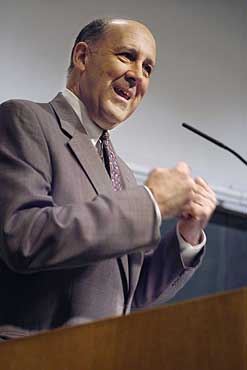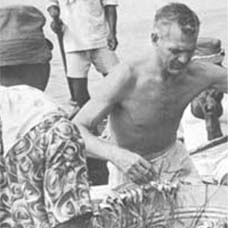
Jim Doyle says: We spent two years in a tiny little village in Tunesia in an oasis far out in the desert, where the people were Muslim. We had a wonderful experience, and we saw how kind and thoughtful very, very religious Muslim people were toward us.
Governor and his wife talk about their faith
By Tom Sheehan
Gov. Jim Doyle and his wife, Jessica, invited members of the Capitol press corps to the executive residence for personal interviews Thursday. In the spirit of the holiday season, state government reporter Tom Sheehan took the opportunity to ask the governor about his views on faith and religion.
By TOM SHEEHAN Lee Newspapers Madison Bureau MADISON - Gov. Jim Doyle and his wife, Jessica, attend Queen of Peace Roman Catholic Church in Madison, where they were married in 1966. The governor said his views on religion have been shaped by his Catholic upbringing, the observance of religions in other cultures and through the study of religion itself.
The couple worked as teachers through the Peace Corps in Tozeur, Tunisia, from 1967-69. After the governor graduated from Harvard Law School in 1972, they moved to a Navajo reservation in Chinle, Ariz., where he worked as an attorney and she as a teacher.
Below are excerpts from the interview, presented in a question and answer format. Responses are presented in the governor's own words, although comments were abbreviated as indicated.
Image
Image Image
Image
What role does faith or religion play in your job as governor, if any? I think as with any person in any walk of life, my faith is part of who I am, how I see the world and how I make decisions. There's no doubt it's part of who I am. I also appreciate the fact that I'm the governor of a state that has people of a lot of different faiths. I didn't get elected because I'm Catholic, and I didn't get elected to be the Catholic governor of Wisconsin. I got elected to be the governor of a state of people with a wide range of faiths. I think America, the United States, figured this out pretty well 200 years ago. I just really strongly believe that, and I think it's one of the reasons you've seen faith flourish here. You've seen a nation that does not impose one religion over another.
You're likely to face some legislation that has fundamental religious connotations. How will you deal with those proposals from a Legislature that has been accused of focusing on "God, guns and gays?'
Because a piece of legislation may be inspired by somebody's religious views doesn't mean it's a bad piece of legislation. That's not the standard. In fact, for that reason it may be a very good piece of legislation.
(For example), to try to make sure that kids, no matter what their economic circumstances, get off to a good start in life, to me, that's a religiously inspired piece of legislation. I think the question is really on the merits of whether a piece of legislation is good for the state. I don't believe that having us carry loaded guns in out pockets in crowded shopping malls is good for the state ....
On issues of marriage, to me, Wisconsin law is absolutely clear on this right now. Marriage is between a man and a woman. I think that's how most the people in the state view the term marriage, and that's the law right now. This idea that we keep passing the same law over and over again seems to me particularly inspired to do nothing other than to try to inflame people's passion on this .... It's not like we need to pass another law, and you don't need to pass a law a second time and a third time.
What shaped your religious views? I grew up in a very Catholic family. I attended public schools. But in those days, if you were a Catholic student going to a public school, they gave you, like triple the religious instruction to make up for it. So a lot of my summers were spent in religious instruction schools ...
But in many ways, the Catholic religion I grew up in is very different than the Catholic church we go to now. I grew up in (the era of) a Latin Mass and a religion that was really focused on legalisms - did you do this exactly right or that exactly right? And what exactly are the consequences if you do this or that? I'm very interested in (religion). I read very widely in it. I'm very interested in the history of religion. I've read quite a bit of the historical Jesus in trying to look at the gospels and other writings of the time in different ways, so it's something that's interested me spiritually very deeply.
This is obviously a huge topic, and one that you could spend a long time on. I believe that religion should not be - and this is my personal view that I've arrived at, and others disagree with it. But I don't think religion should be the basis for harsh judgement of others, and I don't think it should be the basis of dividing people.
We've had the opportunity to live in some really remarkable places, and in communities of very different religious beliefs than the ones we grew up with.
We spent two years in a tiny little village in Tunesia in an oasis far out in the desert, where the people were Muslim. We had a wonderful experience, and we saw how kind and thoughtful very, very religious Muslim people were toward us.
It was their religion in that little village, many years ago, and this was before the rise of a lot of the militant things you see now - but it was clearly their religion that taught them very clearly that when outsiders came to the village, they were to be greeted warmly as friends, and they were to be received and to be helped.
We spent three years living on a Navajo reservation in an area as large as the state of West Virginia in which we worked and lived with very traditional Navajo people, many of whom were non-English speakers and had a very spiritual view of the world, very different from the traditions that we had grown up with, and yet again we were greeted with kindness, hospitality and warmth.
It was clear their spiritual view of the world - the Navajo view of the world to live in harmony meant very much that you were to live in harmony with people.
I think we've learned a lot, not just from the particular religion that we grew up with, but we've learned a lot from living in different cultures and from having family members of many different religions. For example, I see with many of my Jewish friends, this incredible commitment to social justice that comes out of Judaism.
To me, religious inspiration isn't so much what particular religious tradition you came from. It's what motivates you toward higher ideals, and the higher ideals that seem to be pretty universal from what I can see, and certainly the ones that I share, is that religion shouldn't be the basis for harsh judgements. It shouldn't be the basis for telling everybody else how they ought to live, and it shouldn't be the basis for dividing people.
That's sort of where I come to in my life in all of this, and other people feel, I mean I understand I have heard and spoken with many times other people who believe that there is one way and only one way that you are supposed to believe. I actually was kind of raised thinking that, and I have come to understand that the faith I was raised in is a great one, particularly as you open it up more and realize how universal these spiritual and religious feelings are of people.









